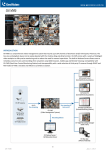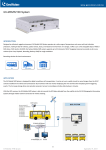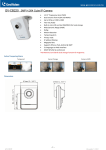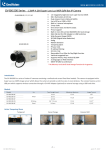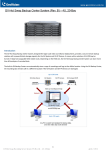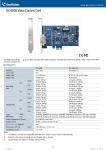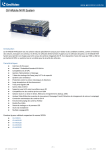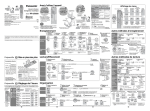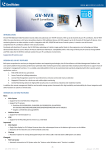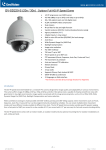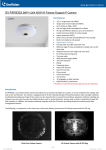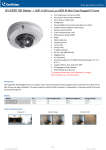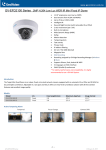Download Geovision GV-VMS system management software
Transcript
INTRODUCTION GV‐VMS is a comprehensive video management system that records up to 64 channels of GeoVision and/or third‐party IP devices. The live view and playback layout can be easily adjusted with the intuitive drag‐and‐drop function. GV‐VMS comes with a variety of intelligent video analytics to offer precise monitoring and to reduce the need for manual supervision. The built‐in Webcam Server allows users to remotely access live view and recordings from anywhere using Web browsers, mobile app and Remote ViewLog. Compatibility with GV‐CMS (GeoVision Central Monitoring Station) and interoperability with a wide selection of third party IP cameras through ONVIF and PSIA make GV‐VMS a versatile and effective surveillance solution. -1GV-VMS May 15, 2015 • • • • • • • • • • • • • • • • • • • • Customizable layout for live view and playback with drag‐and‐drop support Support for multi‐monitor display Support for Microsoft SQL and Access database type Support for Service Mode Support for up to 64 channels Support for over 1,000 IP camera models Auto search for IP cameras Support for H.264 and MJPEG codec Support for resolution from CIF to megapixels Smart Dual Streaming for monitoring and recording Support for GPU decoding and GPU fisheye dewarping Intelligent video analytics PIP and Focus View functions Multi‐level password management and support for authentication server Smart timeline playback and instant playback Support for e‐mail notification upon events I/O and alarm management with e‐map and visual automation Remote viewing and playback using iOS/Android devices, Web browsers, and GV‐Edge Recording Manager Centralized management with GV‐CMS Fisheye 360 degree de‐warping for live view and playback Features Monitoring • • • • • • • • • • • • • • • • • • • • • • • • Support for 64 channels in GV‐VMS and CMS applications Support for GPU decoding and GPU fisheye dewarping Customizable layout for live view and playback with drag‐and‐drop support Multi‐monitor display to show live view and playback on different monitors Support for Microsoft SQL and Access database type Support for over 500 GeoVision and 3rd party IP camera models – see IP Camera Support List Auto search for IP cameras Support for H.264 and MJPEG codec Support for resolution from CIF to megapixels Smart Dual Streaming for monitoring and recording Panel resolution up to 4K Noise Tolerance for Motion Detection E‐map System log Support for up to 1,000 accounts for logins and passwords Multi‐level passwords protection and password expiration management I/O devices control PTZ control panel and PTZ auto functions System Idle Protection Live view buffer and frame rate control Live View Object Index to show the objects or faces captured Dual stream on‐demand display Fisheye dewarping for GeoVision and 3rd party fisheye cameras Support for ONVIF, PSIA, and RTSP protocols -2GV-VMS May 15, 2015 Intelligent Recording, Smart Search and Easy Playback • • • • • • • • • • • • • Continuous recording (round‐the‐clock) and recording triggered by motion detection, alarm and schedule Adjustable recording quality and frame rate for each camera Pre‐motion/IO and post‐motion/IO recording Timeline Search Object search Thumbnail browse to quickly search for specific frames within video footage Instant Playback Extracting frames from a video clip during playback Support for Daylight Saving Time (DST) Support for recording in standard H.264 and MJPEG codec Support for configuration change without stopping recording Continuous playback of set frames A to B AVI repair utility Video Merging and Export • • • • • • Exporting video recording within a specified time range Exporting videos in EXE format, playable with any third‐party players Exporting videos of multiple channels in a single AVI video Support for Windows burning software Time Merge function for exporting a full‐length video with recorded and non‐recorded periods Support for saving dewarpped fisheye view in AVI format Notification • • • • E‐mail notification with attached video images upon specified alert conditions Camera popup upon motion or I/O trigger Computer alarm upon recording errors, input, motion and other alarm conditions Video lost detection and notification through on‐screen message Video Analytics • • • • • • • • • • • • • • Object Counting People Counting Intrusion Alarm Face Detection Privacy Mask Panorama View Defog Function Video Stabilization Wide Angle Lens Dewarping Motion Detection Crowd Detection Scene Change Detection Unattended and Missing Object Detection Fisheye dewarping and object tracking in fisheye view Utilities • • • • • • Dynamic DNS Digital watermark Windows lockup Fast backup and restore (FBR) Bandwidth Control program Skype Video Utility to notify upon motion / input trigger * -3GV-VMS May 15, 2015 WebCam for Remote Surveillance • • • • • • • • SSL Encrypt Connection Support UPnP™ Support Control Panel on Single View to provide instant information and operation Support for PIP, Focus View, Defogging Live Videos, and Video Stabilizer in Single View Restricting Power User and User to access WebCam Server at specified time length Event List Query Download Center Remote E‐Map with pop‐up live images upon input trigger Advanced I/O Control • • • • • Visual Automation to intuitively trigger an output by clicking on the camera view Virtual I/O control Record video, send e‐mail notification and trigger output upon input trigger Move PTZ camera to a preset location on input trigger Latch Trigger feature Remote Monitoring Software • • • • WebCam GV‐Mobile Server GV‐Edge Recording Server (Windows /Mac) GV‐Eye for Android Smartphones and iPhone / iPod / iPad IT Technology • • RSA Network Security Authentication Server: centralized control of password settings in multiple GV‐VMS with support for Windows Active Directory Integration with Centralized Management Software • • • • GV‐Center V2 GV‐Vital Sign Monitor GV‐Dispatch Server GV‐Control Center Note (*) : Skype version 7 or later is not supported currently. License GV‐VMS supports connection with up to connection with up to 64 IP devices. You can connect up to 32 channels of GV‐IP Devices for free. If you need to connect more than 32 channels of GV‐IP Devices or connect with third‐party IP devices, license is required. Supported Devices GV IP Devices Only GV + 3rd‐Party IP Devices Channels License 32 ch No license required 64 ch GV‐VMS Pro license required, 32 ch per license 32 ch 3rd‐Party license required, in increments of 1 ch 64 ch 2 licenses required: • GV‐VMS Pro license, 32 ch per license. • 3rd‐Party license, in increments of 1 ch. Note: GV‐USB Dongle comes in internal and external dongles. It is recommended to use the internal GV‐USB Dongle to have the Hardware Watchdog function, which restarts the PC when Windows crashes or freezes. -4GV-VMS May 15, 2015 Minimum System Requirements Below are the minimum PC requirements needed to connect GV‐VMS with 32 and 64 channels of GV and 3rd party IP cameras (dual streams). CPU GV‐VMS (Up to 32 Channels) GV‐VMS Pro (Up to 64 Channels) OS 64‐bit Windows 7 / 8 / 8.1 / Server 2008 R2 / Server 2012 R2 CPU 4th Generation i3‐4130, 3.4 GHz 4th Generation i7‐4770, 3.4 GHz Memory 4 GB RAM 8 GB RAM Note: To use the fisheye dewarping function, the graphic card must support DirectX 10.1 or above. Minimum Network Requirements The data transmitting capacity of GV‐VMS depends on the number of Gigabit connections available. The numbers of Gigabit network cards required to connect 64 channels are listed below according to the resolution and codec of the source video. Codec H.264 MJPEG Resolution Bitrate Used (Mbps) Total FPS for 64 ch Gigabit Network Cards Required Max. Channels Supported per Network Card 1.3 MP 5.05 1920 1 Max. 64 ch / card 2 MP 7.01 1920 1 Max. 64 ch / card 3 MP 10.48 1280 1 Max. 64 ch / card 4 MP 11.65 960 2 Max. 50 ch / card 5 MP 16.48 640 2 Max. 38 ch / card 1.3 MP 32.36 1920 3 Max. 22 ch / card 2 MP 44.96 1920 4 Max. 16 ch / card 3 MP 38.73 1280 4 Max. 18 ch / card 4 MP 40.35 960 4 Max. 17 ch / card 5 MP 30.48 640 3 Max. 22 ch / card Frame rate limit in a single hard disk Since the size of transmitted data from IP cameras may be quite large and reach beyond the transfer rate of a hard disk, you should note the total recording frame rates that you can assign to a single hard disk, as listed below. Video Resolution H.264 MJPEG Frame Rate Bit Rate Frame Rate Bit Rate 1.3 MP (1280 x 1024) 660 fps 5.05 Mbit/s 300 fps 32.26 Mbit/s 2 MP (1920 x 1080) 660 fps 7.01 Mbit/s 210 fps 44.93 Mbit/s 3 MP (2048 x 1536) 440 fps 10.48 Mbit/s 140 fps 38.67 Mbit/s 4 MP (2048 x 1944) 330 fps 11.65 Mbit/s 105 fps 40.53 Mbit/s 5 MP (2560 x 1920) 220 fps 16.48 Mbit/s 80 fps 30.4 Mbit/s Note: The data above was determined using the bit rate listed above and hard disks with average R/W speed above 110 MB/s. The frame rate limit is based on the resolution of video sources. The higher video resolutions, the lower frame rates you can assign to a single hard disk. In other words, the higher frame rates you wish to record, the more hard disks you need to install. For the information of recording frame rates, you may consult the user’s manual of the IP camera that you wish to connect to. Total frame rate and number of channels supported Refer to the documents below to see the total frame rate and number of channels supported by GV‐VMS when connected to different IP devices. • IP Device Integration Notes • GV‐Fisheye Camera Integration Notes -5GV-VMS May 15, 2015 Specifications Video Input Up to 64 channels Audio Input Up to 64 channels Video Codec MJPEG, H.264 Audio Codec 16 kHz / 16‐bit, 32 kHz / 16‐bit Video Resolution From CIF to megapixels Networking LAN, WAN, Internet, Modem Dial‐up, Modem‐to‐Modem, ISDN Backup Device HDD, NAS, CD‐R / R‐W, DVD+R / +RW, DVD+R (DL), ZIP, JAZ, Blu‐ray, GV‐Storage System Language Bulgarian / Czech / Danish / English / French / German / Greek / Hebrew / Hungarian / Italian / Japanese / Persian / Polish / Portuguese / Russian / Serbian / Simplified Chinese / Slovakian / Slovenian / Spanish / Traditional Chinese / Turkish Note: All specifications are subject to change without notice. Options Optional Devices Description Internal USB Dongle The USB dongle can provide the Hardware Watchdog function to the GV‐VMS by restarting the computer when Windows crashes. You need to connect the dongle internally on the motherboard. GV‐HUB V2 An easy way for serial port extension, this hub can add 4 RS‐232 / RS‐485 serial ports through the GV‐VMS’s USB port. GV‐COM V2 GV‐COM V2 can add 1 RS‐232 / RS‐485 serial port through the GV‐VMS’s USB port. GV‐COM V3 GV‐COM V3 can add 1 RS‐485 port to your computer through a USB connector. GV‐IO Box (4 Ports) GV‐IO Box 4 Ports provides 4 inputs and 4 relay outputs, and supports both DC and AC output voltages. A USB port is also provided for PC connection. GV‐IO Box (8 Ports) GV‐IO Box 8 Ports provides 8 inputs and 8 relay outputs, and supports both DC and AC output voltages. You can connect the unit to the PC either by using its USB port or through network by using its Ethernet module. GV‐IO Box (16 Ports) GV‐IO Box 16 Ports provides 16 inputs and 16 relay outputs, and supports both DC and AC output voltages. You can connect the unit to the PC either by using its USB port or through network by using its Ethernet module. GV‐Joystick V2 GV‐Joystick V2 allows you to easily control PTZ cameras. It can be either plugged into the GV‐VMS for independent use or connected to GV‐Keyboard. GV‐Keyboard V3 GV‐Keyboard V3 is used to program and operate GV‐VMS and PTZ cameras. Through RS‐485 configuration, it can control up to 36 GV‐VMS. In addition, you can connect PTZ cameras directly to the keyboard for PTZ control. GV‐IR Remote Control GV‐IR Remote Control allows you to control GV‐System at the maximum operation distance of 7 m (22.97 ft). -6GV-VMS May 15, 2015






